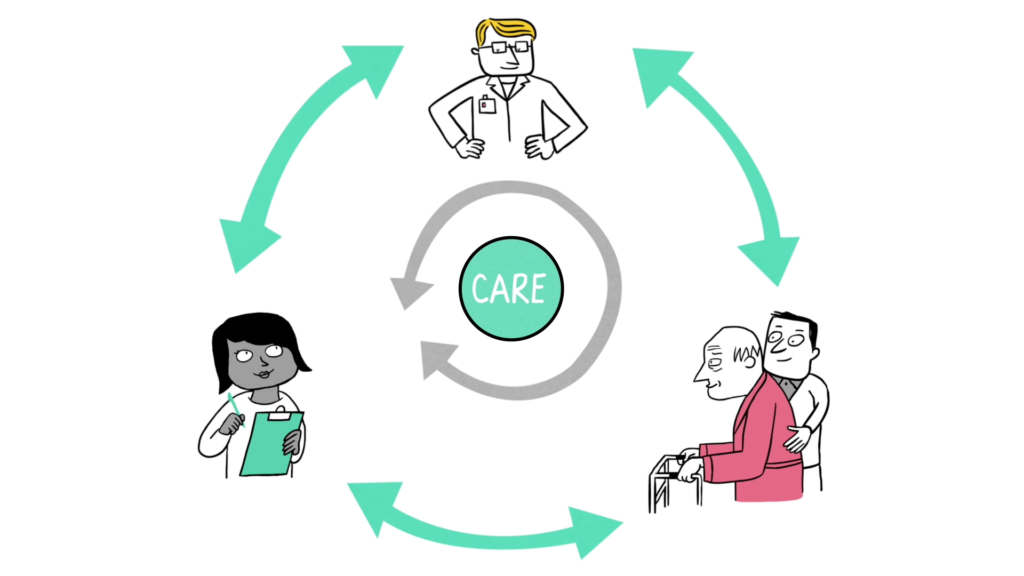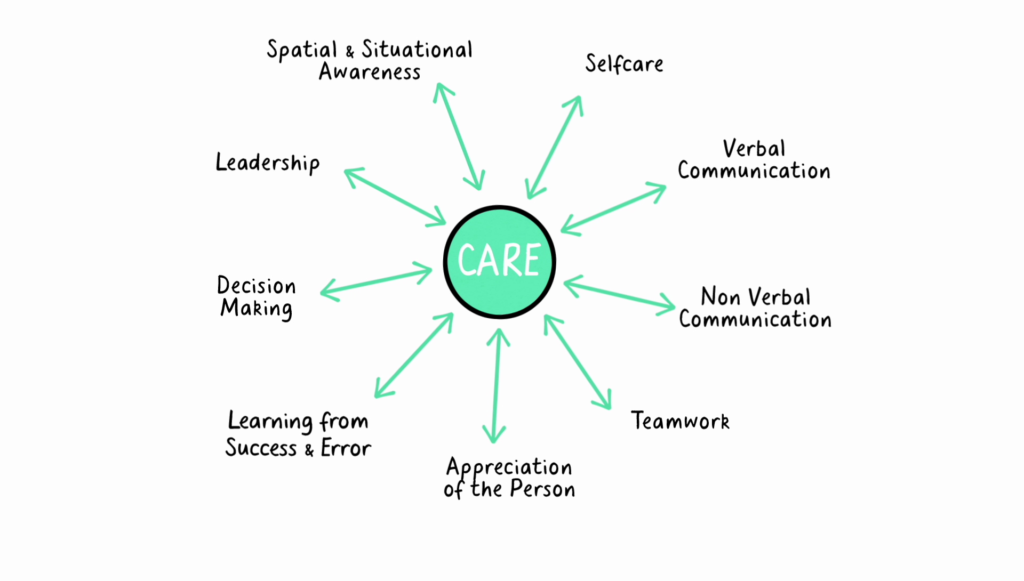
Over the last 15 years, we have been working with healthcare professionals, providing support and education to help with some of the every-day challenges in healthcare practice. Over this period, we created a resource with colleagues at Guy’s and St Thomas’ NHS Foundation Trust in London – called Circle of Care – which may be helpful to everyone right now.
The Circle of Care is a framework originally intended to support healthcare professionals in providing good, compassionate care, connecting “me” – a healthcare professional – to my colleagues, and to my patients and their carers. It is a relational framework for care, showing the ways that good care flows multi-directionally between people. It draws on the principle that you can’t care for others if you are not caring for yourself, and vice versa.
It acknowledges that care is shared value – a motivation – for everyone working in healthcare, but that it is not enough to ‘feel’ caring – it needs to be demonstrated and embodied through actions and behaviours. To address this – the Circle of Care outlines a set of tangible skills: verbal and non-verbal communication, teamwork, spatial awareness, appreciation of each person; that can help to support the flow of care and remove any obstacles in its way. We made a short animation about the Circle of Care in a healthcare context that you can watch here.
The Covid-19 pandemic has shown us how profoundly connected and reliant on each other we are, to collaboratively and collectively manage this situation. Never has an appreciation of the multi-directionality of care felt more important: We need everyone to care – my ability to look after myself and those around me is linked to others’ abilities to do the same. In the media, we hear messages about showing compassion for each-other: “Please look after yourselves, look after your families, look out for one another”. Whilst we have some specific direction for how to do this: “Stay at home”; “Wash your hands”; “Stay two meters away”, providing kind and compassionate care for each other during this moment requires a nuanced, flexible set of skills, that can be explored and consciously embodied.
A relational model of care may then be useful to help support and care for each other in these unprecedented, strange and uncertain times.

Circle of Care – The Flow of Care
And finally –

Circle of Care – The Skills Compass
We all know that we need to look after ourselves and take care of both our physical and mental health: but what does this mean within our new reality? How do we adjust to new ways of moving, eating, sleeping and communicating?
How are you communicating with the people you share space with? Are you able to express your needs – this might help support your self-care? What information are you sharing? What language and metaphors are you using to talk about the pandemic – how do they make you feel? How loudly or softly do you speak about over the phone, skype, zoom? How does this affect others around you?
What non-verbal signals are you giving out to those in your space? Are you stressed, jittery, lethargic, anxious, full-of-beans – can you become aware of these and consider how you might address them, physically? Can you consider hand-washing as a new, important act of non-verbal care?
Space has taken on new meaning for many of us in these difficult times. How are you sharing space with those around you? How do you keep your distance? Do you feel you have enough space, are you allowing others the space they need? How are you arranging your furniture and objects in your room to maximise your space? What are some practical strategies you could bring into your life to make this easier?
This skill is about consciously giving acknowledgement and valuing each other. Can you use this time to learn more about each other? Appreciating that people’s values, needs and experiences in this time will be diverse and all deserve respect; communicating clearly with each other so that you understand.
This is a new time for all of us. Check-in – what works for you, and what doesn’t? What makes a day at home feel ok, and what makes it more challenging? Can you build rituals and structures that are supportive?
What strategies can help us prioritise and make decisions during this period, when there is so much uncertainty? How can we support each other in this?
In many ways, we must all work together to manage this situation. How can we feel connected whilst we may be far apart? How can we build solidarity and community to support each other?
What skills do you have that could help support those around you? What behaviours are you modelling – to your household, community, friends?

With these skills, we can then apply them to support the different relationships within the circle. I can care for my household by washing my hands, respecting their space and shared environments, communicating well; and they can do the same for me. Similarly, my community will care for me by keeping appropriate physical distance, figuring out how to communicate if we become unwell or are isolated and helping each other safely. And crucially, how can all of these skills help us support our own self-care – which we know will be crucial if we are to effectively care for each other.
Over the coming weeks, we will delve into each of the skills in more detail, considering practical strategies that can support you, your households and communities to look after one another over this period.